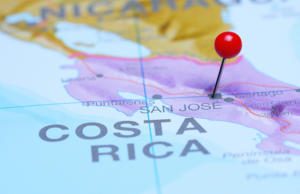
The Costa Rica News (TCRN) – Real estate analysts in Costa Rica are now agreeing on 2014 real estate reviews and gearing up for 2015 forecasts.
The big winners for 2014 were gated communities and vertical real estate in the Greater San Jose Metropolitan Area (GAM). Those companies that were and are able to take advantage of the significant rise in local middle-class Costa Ricans shopping for leisure properties, especially in the Central Valley of San Jose, led the market in sales for 2014.
The housing market has changed considerably over the past couple of years. There was a reduction of foreign buyers during the 2013 and 2014 low (rainy) season, but more Costa Ricans were buying and that kept the market turning. Reports for the last quarter of 2014 show expat buyers looking for bargains; small homes, residential lots in promising leisure areas like the Central Valley and rural lots.
At the end of 2012, The Costa Rica News (TCRN) received a forecast from Daniel Yepez, a leading Real Estate Specialist, who predicted in 2013 and 2014 that Costa Rica would see ever-increasing numbers of Costa Rican buyers capturing leisure properties and taking advantage of the buyer’s market that was left somewhat vacant of foreign property hunters. Mr. Yepez also predicted convenient rural regions, as well as the Greater San Jose Metropolitan Area (GAM), would see a significant uptick in inventories with an increase in activity with both foreign and local investors for these areas.
TCRN asked Mr. Yepez what he foresees for the 2015 and 2016 real estate market in Costa Rica.
“Investment/Leisure property buyers combined with niche property hunters like ‘Preppers’ who have particular interest in larger tracks of farm land. Properties that have fresh water through natural springs will increase in demand, and properties that can be used in more than one way to generate both short and long term income will also be preferred,” said Mr. Yepez

Real estate agencies and finance lenders in Costa Rica see an ongoing demand for vertical residences and gated communities in the Greater San Jose area. Gated neighborhoods offering security will continue to be very attractive with foreigners as well as Costa Ricans who seem more willing to live in communal neighborhoods.
Condominium towers offering security, luxurious finishes and full amenities were popular in 2014 and will continue to be popular in 2015. A trend of mixed zoned communities for residential and commercial areas is on the rise as well as low-rise condominium towers spreading in GAM districts. Hotspots include Ciudad Colon, Santa Ana, La Guacima, and Alajuela. The regions to really stay sharp on are Escazu, Santa Ana, and La Sabana which will stay in high demand, although pricing may be capping.
The Central Pacific’s proximity to San Jose and its still bearish market will continue to see an upswing throughout 2015 and into 2016. Lots, in particular, will stay hot, as inventories are good and prices are low, and this draws local Costa Rican buyers. As well, the uptick in baby boomers and retirees looking for low priced lots continues to grow.
The New Era for Real Estate in Costa Rica
The real play, however, is in what Daniel Yepez terms as Multi-Purpose Real Estate (MPRE).

The dynamics of the market and the buyers have changed significantly in the last few years. Buyers aren’t just interested in owning a piece of property…they expect to get more out of it than before. Conscience buyers want to exploit other areas of their investment and are looking to make their property work for them. As such, buyers are seeking out H2O Properties, which have water features within the land they buy. Consider, for example, a property with a river or waterfall for future hydropower or where abundant water is available for fish farming or aquaculture. These types of MPRE investments also attract the “Prepper Community” who are seeking out these features to complement their future needs. Prepper Properties are a growing market in a world where the population continues to grow out of proportion and land with resources such as water are becoming limited. It doesn’t take much to see the logic behind this type of trend as climate change and geopolitical instability are primary concerns for example. The need to provide safeguarding elements for one’s family is thinking ahead.
Large Infrastructure Announcements in 2014 Indicate Steady growth for the Region
In 2014 Costa Rica gave the go-ahead for two important expansion projects. The first was the expansion of the national airport in Costa Rica’s Southern Zone. Evelyn Fernandez Mora, Director of Civil Aviation in Costa Rica, said in the business weekly El Financiero, that they are currently awaiting environmental impact studies, but the Southern Zone’s International Airport in Costa Rica’s latest effort in expanding its tourism industry.
The other big announcement is the plan to replace and move Costa Rica’s main international airport to Orotina in the province of Alajuela, on the Central Pacific lowlands. The future international mega-airport could triple the capacity of the Juan Santamaria International Airport in Alajuela. The airport is scheduled to open as early as 2025.
These projects are expected to have significant investment impact for the entire Central and South Pacific region over the coming decade.
For more information on the top investment locations in Costa Rica, contact us!

The Costa Rica News (TCRN)
San Jose, Costa Rica
